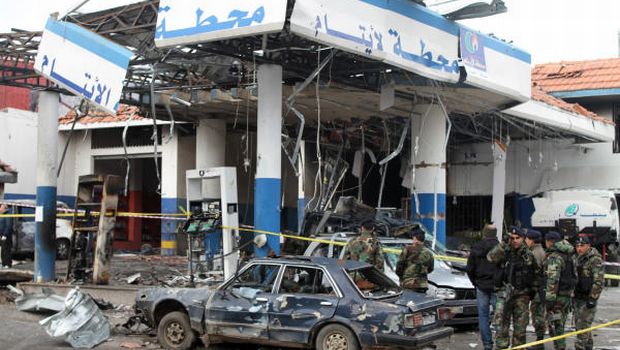
Lebanese army soldiers stand guard at the site of a car bomb, that targeted Al-Aytam service station the day before and left at least four people dead, in the town of Hermel, in Lebanon’s eastern Bekaa valley (AFP PHOTO/STR)
The blast occurred in the town of Hermel at the northern end of the Bekaa Valley, an area populated mainly by Shi’ite Muslims among whom Hezbollah draws its support.
Lebanon’s National News Agency (NNA) cited witnesses who said the perpetrator entered the petrol station and asked to buy fuel before detonating the bomb, leaving a metre-deep hole in the ground and setting the station and nearby cars on fire.
Images broadcast on Hezbollah’s Al Manar television showed fire raging beside a severely damaged petrol station as well as emergency vehicles and security forces at the scene.
A security source told Reuters that, besides the three dead bystanders and the dead bomber, 28 other people had been wounded.
A Twitter account purportedly run by the Lebanese branch of the Nusra Front, a Syrian rebel group with links to Al-Qaeda, said it had carried out the attack, but it was not possible to verify the claim.
The Lebanese affiliate has also claimed responsibility for last weekend’s rocket attack on Hermel and suicide bombings in January that killed three people in Hermel and four people in Beirut’s southern suburbs.
In earlier statements, the Nusra Front in Lebanon threatened to attack Hezbollah outposts and strongholds, including civilian population centers.
Saturday’s blast fitted a pattern of attacks by rival sectarian groups on each other’s strongholds that has been amplified by Syria’s civil war.
Lebanon’s caretaker interior minister, Marwan Charbel, told Reuters that the situation in Lebanon was “unstable and getting worse every day”.
“This matter is very, very dangerous,” he said. “It is bigger than the security apparatus.”
Suicide bombers often use stolen vehicles, and Charbel said up to 400 cars had been stolen in Lebanon in the last six months.
“This is a strange path for Lebanese, because most of the explosions we see are carried out by Lebanese,” he said.
Saturday’s blast happened near a building that houses a charity connected to the late Shi’ite Grand Ayatollah Mohammad Hussein Fadlallah. Fadlallah, who died in 2010, was not a member of Hezbollah.
Shortly after the explosion in Hermel, a bomb went off near an Al Manar office in the Beirut neighbourhood of Ouzai, a security source said. It was not clear whether the Hezbollah-run television station had been targeted or whether anyone was hurt.
Hezbollah-run areas are frequently hit by bomb and rocket attacks claimed by Sunni militants. Four car bombs have exploded in Hezbollah’s stronghold of south Beirut since July. A pair of suicide bombings at the Iranian embassy in November killed at least 25 people including an Iranian diplomat.
Hezbollah has sent fighters and advisers to aid President Bashar Al-Assad, a member of Syria’s Alawite minority, which is an offshoot of Shi’ite Islam. Both Hezbollah and Assad are supported by Shi’ite Iran.
Hezbollah’s intervention in Syria and the steady flow of Lebanese Sunnis joining the anti-Assad rebels have both fueled sectarian strife in Lebanon, which has taken in more than 900,000 refugees from the Syrian civil war.
